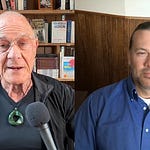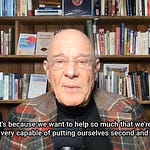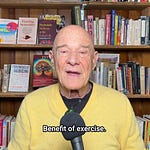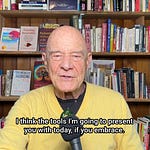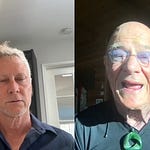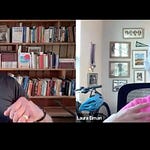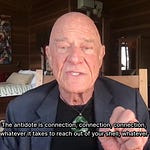Dear Listeners,
I enjoyed my thought-provoking discussion with Justin Townsend of MycoMeditations in Jamaica - a pioneering model for aboveground psychedelic-assisted therapy. Given my background directing a residential treatment center at Wilbur Hot Springs, I understand firsthand the monumental effort required to facilitate transformation for visitors. Justin and his team have accomplished something remarkable. Since 2014, MycoMeditations has now facilitated over 2,000 psilocybin-assisted journeys for clients struggling with conditions like PTSD, depression and addiction.
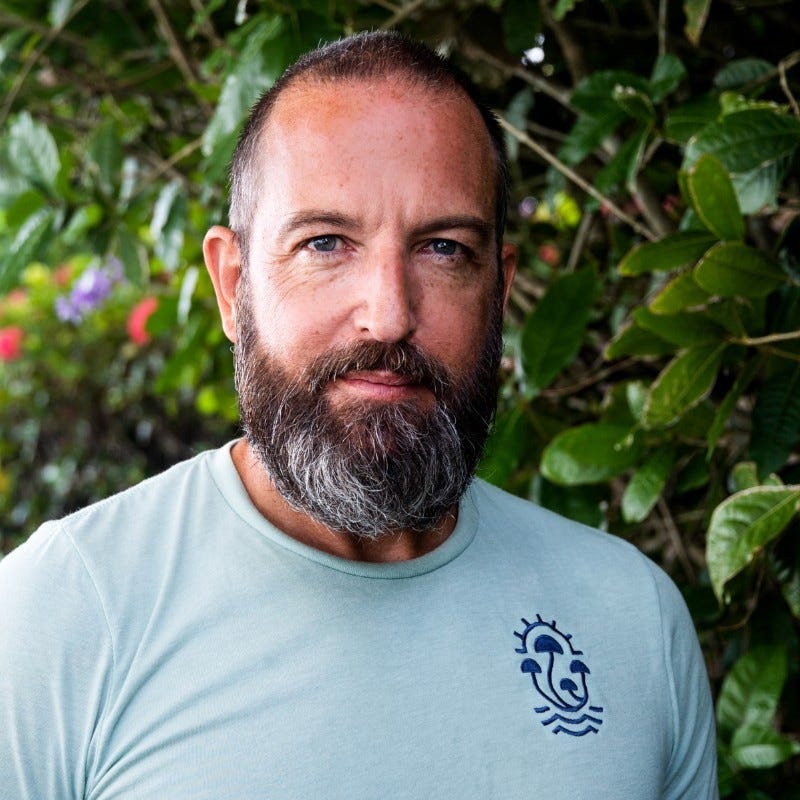
The recent outcomes data on 400+ recent participants speaks for itself:
88% gained psychological insights
95% felt safe in sessions
98% would recommend their retreat model focused on preparation, personalized journeys and integration.
60% with PTSD saw sustained symptom relief even 12 months later - exceeding most interventions.
As more of the barriers in the United States lift, MycoMeditations charts one potential path for cost-effective treatment going forward: group therapy sessions with one-on-one help available as needed. The sustainability of this endeavor depends on a number of safety protocols.
First, careful vetting ensures suitability. 30% of prospective clients are declined to prevent risks that intensive work may amplify if unsupported. While potent catharsis often surfaces traumatic memories requiring navigation, staff are trained as compassionate guides through deep waters.
Although not available in the United States yet, MycoMeditations' data and protocols advance the evidence-base and responsible frameworks needed to inform policy change. And because psilocybin remains legal for now in Jamaica, they provide aa glimpse into the future of psychedelic-assisted wellness centers grounded in science and soul.
Getting to know Justin, I discovered a thoughtful global citizen dedicated to this as a calling rather than business. What struck me most was his humility, despite being a pioneer in this emerging field. He carries deep respect for psilocybin's power and meets every person with gentleness. I see MycoMeditations not as a profit-driven business, but a calling.
I hope you find inspiration from Justin's trailblazing efforts as much as I did. Please reach out with any reflections or experiences to share.
Golden light,
Dr. Richard Louis Miller
Mentioned in this Episode…
Organizations:
MycoMeditations: www.mycomeditations.com
Beckley Retreats: www.beckleyretreats.com
Changa Institute: www.changainstitute.com
Books:
"The Psilocybin Mushroom Bible" by Virginia Haze: Amazon Link
"Singing to the Plants: A Guide to Mestizo Shamanism in the Upper Amazon" by Stephan Beyer: Amazon Link
Links to Dr. Richard Louis Miller's Books:
"Integral Psychedelic Therapy": Amazon Link
"Psychedelic Medicine": Amazon Link
"Psychedelic Wisdom": Amazon Link
Other Resources:
Johns Hopkins psilocybin therapy research: www.hopkinsmedicine.org
Listen to learn…
What is daily life like at MycoMeditations' rural Jamaica retreat location?
What meticulous process do they use to screen psychedelic therapy candidates?
Why does MycoMeditations use higher psilocybin doses than research trials and what effects do they see?
How does Justin view emotional catharsis some may see as adverse as instead part of the therapeutic process?
What is the connection between adverse physical side effects like nausea and underlying mental health issues?
How are temporary psychological events and adverse reactions managed?
How does MycoMeditations conduct post-retreat integration and longitudinal outcomes research?
Seeking Psychedelic Testimonials: The Good, the Bad, and the Ugly.
We are currently looking for first-hand accounts of adverse effects of psychedelics—from ‘bad trips,’ to unwanted physiological complications, to abusive practices by guides, therapists, and shamans.
The interviews from this series will go into a forthcoming book on the topic—perhaps the first book its kind.
Please contact me if you would like to be interviewed. You can also leave us a voice message to share your story. We will keep your information anonymous unless you tell us otherwise.
NOTE: The podcast is always freely available thanks to our paid subscribers. Please share this post to show your support for transparency. The following transcript distills the key points from this show into a condensed form. It is meant as a reference - listen to the full episode for an accurate rendition of the conversation.
Transcript
Justin Townsend's Background + Life in Jamaica
Dr. Richard Miller 9:37: Justin, you've lived in many countries. How many, and can you tell us about them?
Justin Townsend 9:44: I've lived in the UK, Germany, had a short spell in the Middle East, about 11 years in the US, and now over five years in Jamaica. It's been more than five years, possibly approaching six.
Dr. Richard Miller 10:04: And under what passport do you travel?
Justin Townsend 10:07: A British passport.
Dr. Richard Miller 10:10: Do you consider yourself a citizen of the world, or do you identify more with a specific country?
Justin Townsend 10:18: My British identity has become quite diluted over the last 40 or 50 years, having lived in various countries and assimilated their cultures. Now, I see myself more as a citizen of the world than of any particular country.
Dr. Richard Miller 10:35: Do you agree that boundaries and borders are man-made, and that they don't reflect how the world naturally is?
Justin Townsend 10:46: Yes, largely. I see the rationale for boundaries and borders, but perhaps one day we'll live without them. Nature, as the perfect example of an entity that works well, sets its own appropriate boundaries. However, when we humans create them, it's often not as fitting, and sometimes for the wrong reasons.
Dr. Richard Miller 11:13: Nature creates boundaries like oceans and mountains, but when we draw a line and say one side is one country and the other side another, that's our doing, and it creates significant problems. We agree. What's life like in Jamaica?
Justin Townsend 11:44: It's incredible. It's a stark contrast from my previous 10-year life in Manhattan. I now live in rural southern Jamaica, in a parish called St. Elizabeth, known as the breadbasket of Jamaica. We've simplified our life here, foregoing things like 24-hour Amazon deliveries. There are cultural differences, like the Jamaican sense of time, which can be challenging to adjust to. But it's an amazing culture and community, and we love it here.
Dr. Richard Miller 12:54: Do you feel a strong military or police presence?
Justin Townsend 13:01: No, not undeservedly. In places like Kingston and Montego Bay, there are sometimes emergencies that warrant roadblocks, involving police or military. But in rural Jamaica, where we are, it's different. The police are more integrated into the community and not as overtly present as in the US.
Dr. Richard Miller 13:40: What's the population size within, say, 10 or 15 miles of where you are?
Justin Townsend 13:51: The overall population of Jamaica is about 3 million, with most concentrated in Kingston or tourist areas like Montego Bay. I'd say about two-thirds of the population is in those areas, and the rest spread across rural Jamaica, so a few hundred thousand.
Dr. Richard Miller 14:20: Are you located inland or near the water?
Justin Townsend 14:24: Right on the water. There's a depression happening in Jamaica right now, so the beach is just about 30 feet to my right. We're very much beach-based.
Dr. Richard Miller 14:40: Do you have a partner? Are you single?
Justin Townsend 14:46:
I'm happily married to my wife, Abby, who's also the Operations Director at Micro Meditations. Working together was a challenge initially, but we've found our balance now.
Dr. Richard Miller 15:21: Do you have children?
Justin Townsend 15:22: Yes, a daughter, who's 25 and based in New York.
Dr. Richard Miller 15:27: Is she in New York City?
Justin Townsend 15:32: Just outside, not quite upstate New York. In a town called Salem.
Dr. Richard Miller 15:45: I have a daughter in Manhattan. Back to Jamaica, how far do you have to travel for food?
Justin Townsend 15:56: We mostly buy locally, either farm or ocean to table. There are small supermarkets for other essentials. For larger supermarkets, we'd go to Mandeville or Kingston, about an hour and a half away.
Dr. Richard Miller 17:10: Does your business, or do you personally, have vehicles?
Justin Townsend 17:15: Yes, they're essential here. We have a team of therapists and psychologists, and properties for retreats and team accommodations, so each property has a car for mobility.




